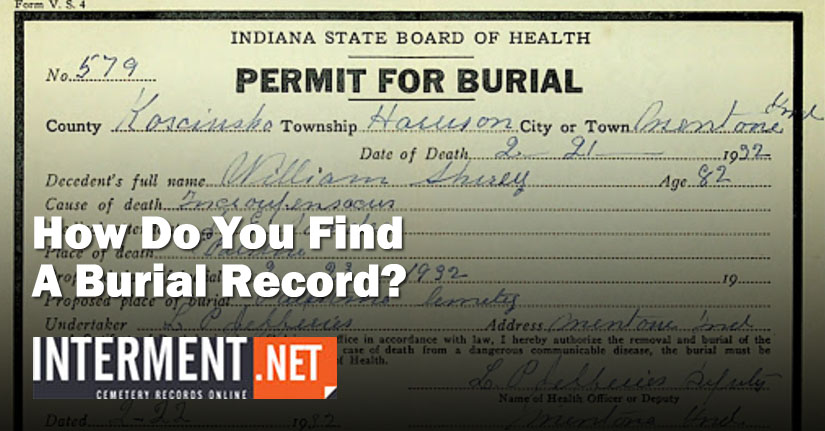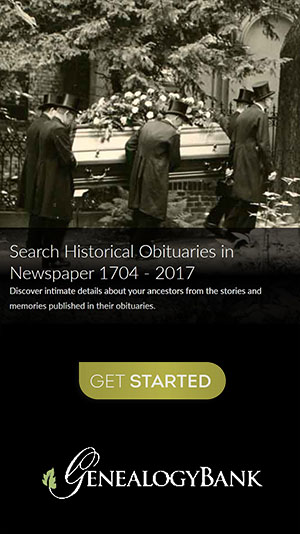Search Death Records (United States)
 U.S. Newspapers, 50 State Full Search (1690-present)
U.S. Newspapers, 50 State Full Search (1690-present) U.S. Obituary Database Search, (1696-present)
U.S. Obituary Database Search, (1696-present) U.S. Birth Announcements Database, (1700s-present)
U.S. Birth Announcements Database, (1700s-present)
How Do You Find Burial Records?
 |
You can find burial records through a variety of online archives, most of which are free to use. Finding a burial record starts by discovering what cemetery someone is buried in. If don't know the cemetery, you can find someone's burial record through local funeral homes, or by searching through newspaper obituaries.
Finding Burial Records
Most family history researchers find burial records through online archives. Most of these archives are free. You can run a burial records search here on Interment.net, and comb through tens of thousands of cemeteries worldwide. You may have to searc for variations of someone's name. Names on tombstones are often difficult to read after 150 to 200 years of weather. Many old documents were handwritten, and the penmanship of those times can be difficult to transcribe.
Check Local Funeral Homes
If online archives don't have the record you're looking for, many genealogists will simply cold-call every funeral home in a local area to see if they handled a service. Funeral homes keep records, and some can go back over 100 years. This only works if you know what city or county a person was interred in.
If you don't what city or county a person was interred in, there's a good chance he or she was buried in the same area where they died. Families will often bury a loved one in the same city where most of the family was buried.
If You Don't Know What City They Died In
You'll have to expand your search at the state-level, if you don't know what city someone died in. Most states permit people to request death certificates as opposed to birth certificates. These certificates will indicate the place of death.
You can also use the Social Security Death Index (link here) which will indicate the place of death. The SSDI, however, only contains names of people who died while receiving Social Security benefits.
Newspaper Obituaries Often Give You the Cemetery
Newspaper obituaries usually indicate the name of the cemetery where burial is taking place, or the name of the funeral home. Looking up old newspapers involves using online newapaper archives. GenealogyBank offers the largest archive. Ancestry, Newspapers, and NewspaperArchive offer smaller, but useful offerings.
Check with City Hall and County Courts
It's very common for cities and counties to own cemeteries for their own residents. If someone died without any next of kin, the city or county becomes responsible for administering their estate and either burying or cremating their remains. Larger cities task this responsibility to a "Public Administrator". This office sometimes falls under the oversight of a Coroner.
Did Someone Donate Their Body to Science?
This happens more and more in recent years. When someone donates their body to science, they donate it to a specific organization or college. Surviving family members then arrange with the organization to receive the remains. If there is no surviving family, the hospital or coroner is supposed to check the national donor registry to see if that person is on it. The registry is not accessible to the public.
When that organization is finished with their remains, the remains get transferred back to the surviving family. If there is no next of kin, the remains are transferred to the Public Administrator in that city or county, and final disposition is made.
Finding Very Old Burial Records
To find older burial records, from 150 to 200 years ago, will require much more work. Many paper records from those times have been lost to fire and floods over the decades.
If you know the city or county where someone died, try contacting the local historical society, or genealogical society in that area. These societies know where all of archived records are from 150 years ago and back.
Search Interment.net
Submit a Transcription
Help genealogists worldwide research their family history!
- No cost to publish your transcription- You retain all rights to your work
- No one can edit, change, or delete your work

